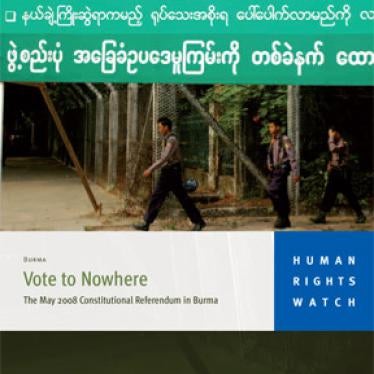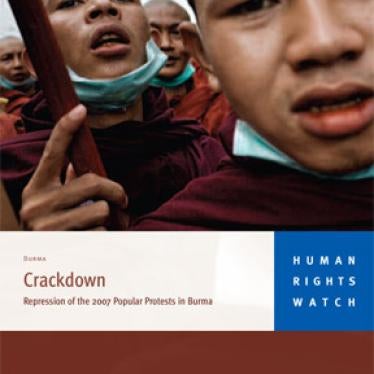There's one country that we're pretty sure won't make it into any of the US presidential debates nor Japan's up-coming general election debates.
Despite all the noise and widespread condemnation just one year ago during the regime's brutal crackdown, Burma is way down the list of priorities for the international community including Japan and the US.
On September 22, 2007, Aung San Suu Kyi appeared at her gate to accept blessings from a group of 500 monks peacefully marching past her home. It was a rare appearance for Burma's best-known political prisoner and leader of the National League for Democracy, who has spent more than 12 of the last 18 years under house arrest.
In August 2008, at the very same gate, aides to the UN Secretary General's special advisor on Burma, Ibrahim Gambari, called out to Suu Kyi through a megaphone to coax her out of her house to meet him. She declined, apparently deciding that Gambari's visits were doing more harm than good. This scene would have been comical if it were not so tragic, as it allowed the government's propaganda machine to portray Suu Kyi as an obstinate obstacle to negotiations.
One year after the peaceful monks' protests that ended in bloodshed, Suu Kyi and 2,100 other political prisoners remain in detention. Meanwhile, the military government seems emboldened by a sham constitutional referendum and the donor support it received after the May 2008 cyclone. It is plodding along with staged political reforms, and it claims it will hold elections in 2010.
I remember sitting in Bangkok watching the events unfold inside Burma a year ago with nervous anticipation. The country seemed primed for change. Thousands of monks, activists and ordinary people took to the streets, in protests set off in part by the doubling of fuel prices in August 2007. But the demonstrations quickly turned into protests against dictatorship. With more than 100,000 people taking part in some marches, Burma was experiencing the largest show of dissent in almost 20 years. When the monks marched past Suu Kyi's gate, the military regime held back. No one stopped them. I dared to wonder, could there be sympathy for the mass movement inside the military-led government? Could Burma's leaders accept this outspoken voice of dissent without sticking in the boot?
The answer, of course, was no. On September 26, 2007 the Burmese army started a brutal crackdown. Security forces aided by government-controlled militias beat, arrested and detained thousands of monks and peaceful demonstrators. Few foreign reporters were able to get into the country while security forces arrested many local journalists who documented events. While Human Rights Watch conducted the most exhaustive on-the-ground investigation into the circumstances of the protests and the bloody crackdown, its full extent remains unclear.
Burmese in and outside the country implored the UN and nations to act and prevent further bloodshed. States both critical and supportive of the military regime called for restraint and condemned the violence. The US, Australia and Canada among others tightened targeted financial sanctions against Burma's leaders. Normally complacent ASEAN expressed "revulsion" at the crackdown. The UN demanded and got access for Gambari. Japan's public was outraged by the killing of video journalist Kenji Nagai. Would the generals finally be held accountable for their bloody actions?
China, Russia and South Africa made sure the answer was no, protecting Burma through their votes at the UN Security Council. Instead of facing concerted international pressure, Burma's generals are sitting pretty, while the international community flounders helplessly in endless dialogue and inaction.
Despite the embarrassment of having a rogue state as a member, ASEAN has not lifted a finger, instead issuing formulaic statements "regretting" Suu Kyi's detention.
Multinational institutions and concerned states have not made serious efforts to pressure Burma's rulers for a desperately needed independent international investigation into the crackdown. UN officials continue to promote reform by visiting Burma, but no one there is listening. On Gambari's last visit, senior government leaders treated him with contempt by refusing to meet with him, and the UN has not put pressure on them to cooperate. Perhaps Gambari should have appeared outside Senior General Than Shwe's house with a megaphone demanding a meeting, as the general and his cronies are the reason Burma is in such a mess.
The May 2008 cyclone that devastated a large part of southern Burma provided unexpected yet convenient cover for Burma's military government to hold a constitutional referendum that passed by a suspicious 92 percent. The new constitution cements military rule.
UN Secretary General Ban Ki-moon, who had declared his "abhorrence"' shortly after the crackdown, visited Burma after the cyclone, declaring he was there to talk about "lives, not politics." While saving lives should certainly have been his priority, it was a missed opportunity that sent the wrong message to Burma's military leaders. Just days after Ban left Rangoon, the regime extended Suu Kyi's detention by another year.
The image of bloodshed for the brave monks and ordinary people who took to the streets should not be simply relegated to another failed uprising in Burma's history. If anything, the event is symbolic of another failure by the UN, the US, Japan, and other nations of influence to address the situation in Burma. It is not too late for an international investigation into the crimes of the past year. China, Russia, India, Thailand and Burma's other friends should pay a political price for their continued support of such an odious regime.
Last month at the UN General Assembly, new Prime Minister Taro Aso declared Japan's candidacy for election to the Security Council. Voting took place on October 17 and Japan was elected. As a newly elected Security Council member state, Japan should make clear if elected as a member of the Security Council, it will put pressure on Burma's generals and confront Burma's protectors, China and Russia. As one year on, Burma is still the elephant in the room for the international community.
Elaine Pearson is deputy Asia director at Human Rights Watch








